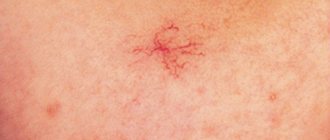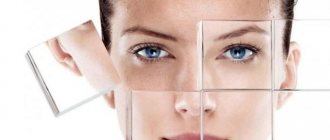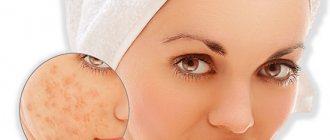What does a dermatovenerologist treat?
Modern dermatovenereology is one of the most extensive areas of therapeutic science, and a dermatovenereologist treats diseases belonging to its different areas:
- dermatology – diseases of the skin and its appendages: nails, hair, sebaceous and sweat glands – psoriasis, vitiligo, atopic dermatitis, eczema, alopecia, folliculitis, etc.;
- venereology – sexually transmitted diseases, genital infections and sexually transmitted diseases: syphilis, gonorrhea, molluscum contagiosum, chancroid, herpes, trichomoniasis, mycoplasmosis, etc.;
- mycology – diseases caused by fungi, including candidiasis;
- conservative cosmetology, the goal of which is to improve the appearance of the skin without surgery.
What remedy helps with acne?
To choose an effective medicine for acne*, you need to correctly determine the severity of acne and understand the causes of acne. Only a specialist can do this. Azelaic acid preparations can be used in the treatment of acne9. One of these is Azelik® gel, it has the following effects5:
- normalizes keratinization processes in sebaceous hair follicles;
- reduces the level of free fatty acids in skin lipids;
- exhibits antimicrobial activity against acnes and S. epidermidis;
- has an anti-inflammatory effect by reducing the metabolism of neutrophils and their production of free radical forms of oxygen.
The first results from using Azelik® gel can be seen after 4 weeks of use5.
*acne
When to contact a dermatovenerologist
Skin is the largest organ of the human body. Currently, there are a huge number of dermatoses and chronic skin diseases, the treatment of which must be carried out in a timely manner. In addition, many skin diseases have a chronic course and are prone to frequent relapses. Contagiousness is another feature common to many skin and venereal diseases.
Unprotected sexual intercourse is a matter of particular concern for one’s own health. Sexually transmitted diseases - sexually transmitted diseases and sexually transmitted infections when neglected can cause irreversible harm to many organs and systems of the body. Modern medicine lists more than 10 sexually transmitted diseases. A dermatovenerologist can successfully cope with all these diseases with the help of timely diagnosis and the prescription of modern medications.
The following symptoms should be the reason for consulting a dermatovenerologist:
- skin rashes on the mucous membranes, genitals, skin of the body;
- itching of the skin;
- changes in skin pigmentation;
- the appearance of various neoplasms on the skin or mucous membranes;
- pustules in the mouth, white plaque on the inside of the cheeks and tongue;
- changes in the color and structure of nails;
- peeling of the skin;
- hair loss has become more intense than usual;
- itching of the scalp, formation of profuse dandruff;
- hair fragility;
- changed color, structure, size of the mole;
- discomfort or pain during sexual intercourse;
- more abundant than usual discharge from the genitals with an uncharacteristic color or odor;
- development of ulcers, rashes, itching in the genital area and mucous membranes of the mouth;
- frequent urge to urinate;
- burning in the genitals;
- pain in the genitals, testicles, abdominal area.
Self-medication or treatment using traditional medicine methods for sexually transmitted diseases is unacceptable and will not lead to results. If the patient has even the slightest reason for concern, it is necessary to see a dermatovenerologist. Timely therapy prescribed by a dermatovenerologist allows you to avoid unpleasant and dangerous consequences and complications and restore health. Modern drug treatment allows you to get rid of sexually transmitted diseases reliably and without dangerous consequences and complications. It is worth remembering that both sexual partners need to be treated by a dermatovenerologist.
A dermatovenerologist performs a preventive examination when a patient registers for work or study.
Skin structure
The skin consists of three main layers: the top layer of the epidermis, the main layer of the dermis with nerves, glands and hair follicles, and the third layer of subcutaneous fat. Each of the three layers can be affected by different diseases. For example, psoriasis is a disease of the epidermis, and cellulite is a pathology of subcutaneous fat.
Sometimes the disease affects all layers, as, for example, in the case of burns or if, due to the abuse of traditional medicine, the foci of the disease have spread deeper. And only a qualified specialist can make the correct diagnosis and prescribe adequate treatment. Depending on the results obtained during the diagnosis, the doctor may prescribe not only external procedures, but also medications, diet, and consultations with related specialists. Modern high-tech equipment allows you to carry out any operations at a high level, quickly and painlessly. Doctors use ultrasound, laser and radio wave equipment.
How is the appointment going?
What does a dermatovenerologist do during an appointment? The initial consultation with a dermatovenerologist begins with collecting the patient’s medical history and complaints. The dermatovenerologist will definitely clarify whether treatment was previously carried out and what medications were used. In the case of chronic skin diseases (psoriasis, vitiligo, atopic dermatitis), the doctor will clarify whether the patient has a family history of these diseases. The patient’s goal at this stage of admission is to formulate as accurately as possible the complaints about the conditions that bother him.
What does a dermatovenerologist look for:
- healthy skin areas;
- pathological areas of the skin;
- assesses the prevalence of the process.
Very often, already at this stage the doctor can assume the correct diagnosis, based on his own experience. If any doubt arises, the dermatovenerologist will necessarily prescribe additional laboratory and instrumental tests:
- general blood analysis;
- scraping the skin for mites;
- bacteriological culture;
- microscopic mycological examination;
- smear of the rash element;
- smear for urogenital infections;
- linked immunosorbent assay;
- biopsy of a mole or any other neoplasm;
- PCR diagnostics;
- dermatoscopy.
In some cases, to determine changes in the structure of the tumor or the extent of the pathological process in the deeper layers of the skin, an ultrasound, CT scan, or consultation with a specialist may be required. Cytological examination of neoplasm tissue will help determine the nature of its cells.
After the disease is diagnosed, the dermatovenerologist prescribes treatment.
Skin diseases (psoriasis, atopic dermatitis, vitiligo, neurodermatitis) often have a chronic course and are prone to relapses. Patients with such diseases need constant monitoring by a dermatovenerologist in order to prolong remission and smooth out the severity of the process during an exacerbation.
What tests do patients with acne vulgaris* undergo? How to treat acne?
Tests that can be prescribed for acne9,31:
- checking the level of free testosterone, LH (luteinizing hormone), FH (follicle-stimulating hormone), dehydroepiandrosterone sulfate;
- performing a glucose tolerance test;
- clinical blood test;
- general urine analysis;
- biochemical analysis of blood and urine;
Based on the results of the tests, if necessary, consultations with other specialists are prescribed, for example, a gynecologist, an endocrinologist.
Blood and urine tests are usually ordered by a dermatologist or esthetician before antibiotic therapy or retinoid (isotretinoin) treatment31. If it is necessary to take oral contraceptives to correct androgen levels, they should be selected by a gynecologist.
Preparing for an examination by a dermatologist-venereologist
In order for the examination by a dermatovenerologist to be as informative as possible, it is necessary to properly prepare for the appointment. As a rule, preparation does not cause any difficulties for the patient. If you have an appointment, please follow these guidelines:
- do not use cosmetics, as well as medicinal ointments and creams on pathologically changed areas of the skin, so as not to change the clinical picture of the rash;
- You can take a shower before use, but do not use aggressive detergents. Use baby soap instead;
- If the cause of your complaints is problems on the scalp or hair, do not wash your hair before visiting a dermatovenerologist for a couple of days. This is necessary so that, if necessary, the doctor can carry out some dermatological tests.
- If you have nail fungus, it is not recommended to cut your nails before visiting a dermatovenereologist because nail particles may be required for microscopic examination. Before visiting a dermatovenerologist, women are advised to remove polish from the nail plate.
- If you suspect a sexually transmitted disease or venereal disease, women should not douche before visiting a dermatovenerologist, so as not to distort the clinical picture of the disease.
When complaining of skin rashes, the patient should remember what could have preceded them: eating unusual foods, contact with animals, taking medications, unprotected sexual intercourse. This information will be necessary for the dermatovenerologist to make the correct diagnosis and prescribe treatment.
If you find yourself with symptoms indicating the development of a dermatovenerological disease, be sure to make an appointment with a dermatovenerologist. The examination and tests will not take much time, but will help dispel doubts about your health status and, if necessary, undergo treatment. Most sexually transmitted diseases respond well to treatment by a dermatovenerologist, and the sooner treatment is started, the higher its effectiveness.
Rosacea
Skin problems can occur against the background of rosacea, which occurs against the background of gastritis. The latter develops against the background of the presence of a bacterium such as Helicobacter pylori. There will also be symptoms of gastritis - abdominal pain, heaviness and a feeling of pressure, heartburn, burning, feeling of nausea. Naturally, in such a situation, a consultation with a gastroenterologist will be required.
Dr. House's favorite disease. Why is lupus dangerous? More details
Types of treatment
Patients with severe rosacea are advised to avoid several important factors that provoke the disease. Cosmetic preparations should be standard, non-greasy, without menthol and camphor. Cleansers should not be in soap, that is, everything should be gentle. Avoid long-lasting cosmetics. Of course, makeup does not provoke the development of the disease at all. But for chronic diseases, creams with protective properties against ultraviolet radiation are used.
Vascular rosacea requires additional diet. But there are no recommendations for use for rosacea. But you still can’t use products that dilate pores and blood vessels. Rosacea can become even redder if you drink alcohol. There are medical options for treating rosacea. Particularly effective for the first and second degrees of the disease. A cosmetologist usually prescribes metronidazole, azelaic acid, perimeter and other drugs.
- The main mechanism of action of metronidazole is not entirely clear, but it has anti-inflammatory elements that reduce the symptoms of rosacea.
- Azelaic acid acts as an anti-inflammatory drug and is involved in the regulation of keratinization.
- Additionally, creams are used that act to strengthen the walls of the capillaries.
Systematic treatment of dermatological pathology is prescribed to patients with complex forms of treatment. The doctor should prescribe tetracyclines, macrolide antibiotics, and isotretinoin.
Lupus
If we are talking about internal diseases that manifest themselves on the skin of the face, then first of all we are talking about lupus erythematosus, says Alexander Zotov. “This is a disease named because of the similarity of the skin manifestations to wolf bites, when the immune system attacks the body's cells. This state of affairs leads to chronic inflammation and the formation of immune complexes that contribute to tissue damage,” notes the dermatovenerologist.
Article on the topic
From infection to allergies. Why spots appear on the skin The reasons for the development of lupus erythematosus are still not precisely known. But doctors have identified a number of risk factors. It can develop as a hereditary disease. In addition, the development of such an autoimmune reaction can be influenced by environmental factors, such as the impact of viruses that can penetrate the DNA of macrophages and change them. Both medicinal and toxic substances have an effect. Ultraviolet radiation may also play a role. There is an increased risk of developing lupus during periods of hormonal stress, such as menopause. Abortion and childbirth can also play a role.
In addition to skin manifestations, this disease is manifested by weakness, fever, hair loss, problems with appetite, etc.











